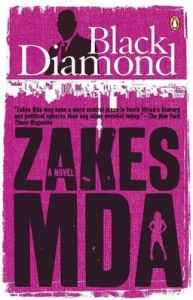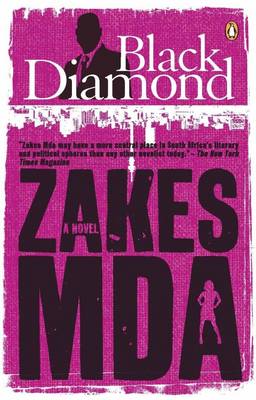
Kristin Uys is a tough Roodepoort magistrate who lives alone with her cat. She is on a one-woman crusade to wipe out prostitution in the town for reasons that have personal significance for her.
1
Free the Visagie Brothers
“NO ONE WILL BLAME YOU if you think Kristin Uys is dressed for a funeral. Not the black folks’ kind of funerals where women give the dead a glorious send-off in the same Versaces, Sun Goddesses and Givenchys that are a staple at such horse racing events as the Durban July Handicap or the J&B Met. Not the joyful events where the living crack jokes about the dead, and get sloshed and dance to loud music at those marathon parties known as ‘after-tears’. But the sad and sombre affairs that pass for funerals in white communities. A calf-length black skirt, an off-white blouse with frills that have gone tired, and a navy blue jacket that seems to be slightly oversized. The black gown, however, will soon disabuse you of any notions of bereavement, and will place you squarely in a courtroom. She is the magistrate. The gown is almost threadbare, with bell-shaped sleeves and shoulder pieces of scarlet. Her blonde hair is tied in an old-fashioned schoolmarmish bun. But the austere look and the severe dress code fail to disguise her fine features.
She sits at the bench and looks sternly at the accused. One glares back at her unflinchingly. He is Stevo Visagie, the older of the two brothers in the dock. He is tiny and wiry. What he lacks in stature he makes up for in his menacing look. His sharp features, leathery skin and penetrating eyes tell us at once that he is tough. The other one hasn’t got the guts to return the magistrate’s gaze. He lowers his eyes. He is Shortie Visagie, a young man with the frame of a wrestler and a perpetually perplexed expression. Although he is obviously as strong as an elephant, he has an avuncular air about him. He may pretend to be tough, but he is really a teddy bear.
The magistrate did not expect this kind of temerity from Stevo; she turns her gaze to the defence counsel. Mr Krish Naidoo stands up to address the court. Before he can utter a word the magistrate says, ‘You are not dressed, Mr Naidoo.’
‘I beg your pardon, your worship?’
‘Next time I will not allow you in my court in that suit, Mr Naidoo.’
He should have known better than to wear a light grey suit in Kristin Uys’s court. Everyone is well aware that she is a stickler for courtroom decorum: a black suit, a white shirt, a bib and a black robe. But sometimes a lawyer forgets, especially because other magistrates are quite lax about such things.
‘I expect such infringements from younger attorneys,’ she adds.
The spectators in the gallery watch expectantly.
Prominent among them are four women in the garish attire and exaggerated make-up of prostitutes. They are huddled together and are paying close attention to the proceedings.
Krish Naidoo suppresses his irritation and apologises to the court. He then proceeds with his closing remarks.
His clients, the Visagie Brothers, are on trial for running a brothel.
‘But the state has failed to make a case against them,’ he says. ‘Evidence given by their mother has shown that the girls found on the Visagie property were their cousins visiting from the platteland.’
The prostitutes in the gallery seem to enjoy this characterisation of their peers. They give the court what they think are coquettish smiles. The magistrate has nothing but disgust for them. All they need to do is give her the slightest excuse and she will have them thrown out of the courtroom. Just as she did this morning when she asked Ma Visagie, the boys’ mother, to leave after she uttered an exclamation of disagreement at something the prosecutor said. It was after she had given her evidence for the defence, had been cross-examined by the state, and had taken a seat in the gallery.
Ma Visagie joined the demonstration in the parking lot in front of the courthouse, and took over from Aunt Magda – who is really not anyone’s aunt – to lead the protesters. The scrawny but feisty matriarch sings with gusto. The small group – consisting of five hookers, three drag queens, and about ten women in black who call themselves the Society of Widows – is waving crude placards with bold letters: Free the Visagie Brothers! and Release Shortie and Stevo!
“The group has even appropriated Free Nelson Mandela, the song by the ska band Special AKA, as its anthem. Of course, they have changed the words Nelson Mandela to Visagie Brothers.”
The demonstration is Aunt Magda’s brainchild – she of the missing front teeth, like a lot of Cape Town people of her generation. She came all the way from the Mother City as soon as she got the message that her boys were in jail. Although she retired two years ago from her long service as the Visagie maid she is still very attached to the boys. After all, she brought them up from the time they were babies and looked after them until they were grown men. Stevo lost his virginity to her in his early teens one drunken night. She even had a tryst with old Meneer Visagie himself before cancer stole him away. She returned to her beloved Athlone after her knees gave up on her because of arthritis, although one can’t see any evidence of that today judging from the toyi-toyi she is performing outside the courthouse – a dance that has mystified her fellow protesters, most of whom have only seen it on television when workers’ unions are on strike and are overturning dustbins.
Most of the women in the group of protesters are community members who are beholden to the Visagie family.
In the same way that mass action brought the apartheid government to its knees, it was bound to bring the post-apartheid justice system to its senses. Aunt Magda assured her supporters that she had studied the methods used by the Release Mandela Committee of old and would apply them to force the magistrate to free her innocent boys. If mass action worked for Mandela, it would surely work for the Visagies. The group has even appropriated Free Nelson Mandela, the song by the ska band Special AKA, as its anthem. Of course, they have changed the words Nelson Mandela to Visagie Brothers.
Ma Visagie does not understand anything about demonstrations, mass actions and organising committees. Her community was never part of that culture. But she is
willing to try anything to get her sons freed. If Aunt Magda says people were released from jail through such actions, then there is no reason why they will not be effective now that those who were once prisoners are the rulers of this country.
The Society of Widows is the culmination of Aunt Magda’s organising prowess. Some of its members are indeed widows whose husbands or boyfriends may have died in some car hijacking misadventure or armoured vehicle cash heist. Others are not necessarily widows in the literal sense. They may be single mothers who have benefited from the generosity of the Visagies or wives whose husbands are useless layabouts. In the tradition of South African criminals who have become folk heroes in their communities, the Visagies often operate on a semblance of the Robin Hood principle. When South African criminals have been gunned down by the police in car chases, or by fellow gangsters in turf wars, you often hear in funeral speeches how generous they were, and how many young people in the community have achieved their dreams of studying at universities, becoming lawyers and doctors as a result of funding from the man now lying in the coffin.
It is the same with Ma Visagie’s boys. That is why Aunt Magda tells a newspaper reporter: ‘The government has failed the widows of this country. The Visagie Brothers have made big donations to our society. They always help those in need. They even pay school fees for kids from poor families.’
Ma Visagie, however, will not let Aunt Magda hog all the limelight. She sings the loudest in her shaky voice. After all, she is the mother of the heroes in question and Aunt Magda was only their nanny.
But the demonstrators’ protest songs cannot penetrate the thick walls of the Roodepoort magistrate’s court, and Kristin Uys presides over the case unperturbed.
In his summing-up Krish Naidoo dismisses the evidence of the policeman who arrested his clients. The policeman, he says, entrapped the girls after one of them turned down his proposal. The Visagies are respectable businessmen who own a scrapyard selling used car parts.
‘They are well known in the community for their good deeds and charitable work,’ he adds.
‘You are wasting this court’s time with irrelevancies, Mr Naidoo,’ says the magistrate. ‘The accused may be the reincarnation of Mother Teresa herself, but that has nothing to do with this case.’
The attorney is deflated.
The court is adjourned to the next day.
Outside the courthouse Ma Visagie is telling another reporter, ‘My boys are innocent. They have been framed by the police; they’re the most angelic children any mother could wish to have.’
But at that time the Visagie Brothers don’t look angelic at all as they are led in handcuffs and leg irons from the courtroom to the holding cells by two burly policemen. One may think they are the deadliest criminals that the police have ever laid their hands on.
As the magistrate walks out of the building the demonstrators sing even louder. They stop short of jeering at her, though. She pays no attention to them and walks to the parking lot.”
Extracted from Black Diamond by Zakes Mda, out now.
____________________________________________________________________________________________________________________________
 |
 |
|
YOU MAY ALSO ENJOY







